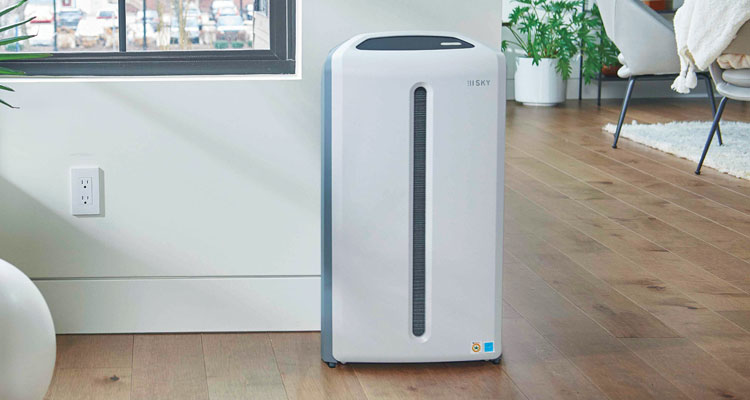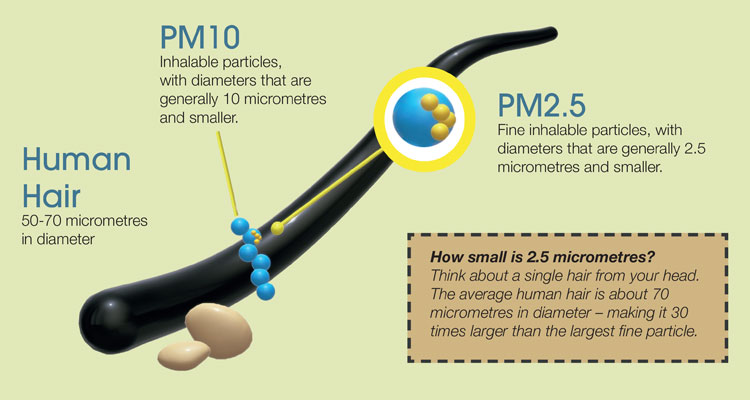
There’s a reason why people escape to the countryside for ‘a breath of fresh air’, and it’s something we should be taking seriously. While there are a few lucky people who get to enjoy clean and crisp mountain air each day, the fact of the matter is — most of us don’t.
We live with many types of pollution in our lives, especially when we commute to and from work. The vehicles that pass us on the roads are spewing out dirty air full of pollutants.
We think everything will be OK when we get inside the office or through our front door at home. Unfortunately, that’s not the case. The Environmental Protection Agency (EPA) in America believes that indoor air is one of the top 5 threats to public health.
This is concerning when you realise that most people spend 90% percent of their time indoors and approximately 65% of their time at home. The latter is where a number of dangerous pollutants can usually be found: pollen, pet dander, cleaning solvent, glue from composite wood furniture, mould, bacteria, fungi, viruses, cosmetics, and not forgetting various plastics.
Fortunately, it’s not all doom and gloom. You can do something about the air quality in your home like using air purifying products, making sure smokers smoke outside, keeping the house super clean and changing bed linen frequently.
On top of all this, arguably the best thing you can do is get yourself an air purifier.
There are plenty of ‘somethings’ in the air that affect the quality of the air we breathe. Here are some outdoor and indoor pollutants that we should be aware about.
Bacteria & viruses Bacteria and viruses are quick to get you and your loved ones under the weather, especially airborne diseases like the flu. |
Exhaust fumes and emissions A build-up of carbon emissions from automobile exhausts and fumes saturate the air with harmful particulates. |
Respirable particle matter (RPM) These airborne particulates are caused by the combustion of various fuels and the breakdown of rock, soil and dust. Construction sites and industrial factories are prime contributors to these kinds of pollutants. |
Haze-induced pollutants Harmful air pollutants like soot particles, toxic gases and fine particulates can affect your lungs when inhaled. |
Volatile Organic Compounds (VOCs) These pollutants are more common than we think. Modern homes are constructed with materials that contain harmful compounds like formaldehyde, benzene and xylene. |
Mould Mould comes in different species each carrying a different effect on our air quality. Black mould, for example, has very serious effect on air quality and our respiratory systems with prolonged exposure. |
It’s not just people with respiratory conditions like asthma that need to worry about clean air, we all do. Unclean air can cause health problems in even the healthiest individual.
Breathing unclean air causes your lungs to work even harder to filter out all the pollutants and toxins. People understand the effects of things like smoking, but might not fully understand the effect unclean air has on their lungs. In the long run, breathing in unhealthy air compromises your lungs’ ability to function at full capacity, or even cause them to deteriorate.
PM is short for Particulate Matter and it’s the term used to cover all the extremely small particles and liquid droplets that float in the air. This can include things like soot, dust and smoke.
These particles can range from things big enough to be seen with the naked eye, down to particles so small that you need an electron microscope to see them.
Fine particles can come from various sources, such as power plants, motor vehicles, airplanes, residential wood burning, forest fires, agricultural burning, volcanic eruptions and dust storms.
It’s not just people with respiratory conditions like asthma that need to worry about clean air, we all do. Unclean air can cause health problems in even the healthiest individual.
Breathing unclean air causes your lungs to work even harder to filter out all the pollutants and toxins. People understand the effects of things like smoking, but might not fully understand the effect unclean air has on their lungs. In the long run, breathing in unhealthy air compromises your lungs’ ability to function at full capacity, or even cause them to deteriorate.

When the amount of PM2.5 is at an unhealthy level, take these steps to reduce exposure and protect your health:
If you must go outside, make it short and quick, and wear a N95 or higher face mask.